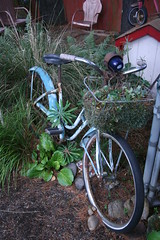wagaboodles asks: What tips do you have for organic gardening?
I try to garden without any chemicals added. What tips do you have? Especially in regards to pest control?
The answer voted best is:
Answer by captbryguy
My tip is on composting. You can compost over 75% of your kitchen waste including eggshells. just dump it and cover with dirt and sand and turn it over in 2 weeks.
Just make a little area in your yard to make this nutrient rich soil…..
What do you think? Answer below!
Powered by Yahoo answers!


Homemade Organic Insect control page:
http://www.ecolivingcenter.com/articles/organicinsectrecipes.html
my only caution is that you use any pest control remedies very carefully….you don’t want to get rid of your benneficial insects
Compost can be your #1 friend 🙂
http://www.co.mecklenburg.nc.us/Departments/LUESA/Solid+Waste/PLANT+Program/Compost+Book.htm
I love the book Secrets of Companion planting. I’ve never used any chemicals, but thats probably why I spend at least a hour a day in my gardens pulling weeds. Composting is another great thing (and I have horses!)
Build up your soil by adding composted organic material (manure, leaves, grass clippings, crushed eggshells, etc.).
The better your soil, the more healthy your plants will be, and they will withstand a few bugs. Don’t expect to wipe out every bug!
Use open-pollinated varieties of plants, which means that the seed can be saved from year to year and still be the same variety. If you save your own seed, you will have plenty of seed, and by planting extra seeds, you can afford to lose a few seedlings to cutworms, for example, and still have plenty for yourself. Even if there was such a thing as ‘organic cutworm dust’ I wouldn’t use it: I’d simply plant extra seed, and squash any cutworms I find while planting and cultivating. It’s an old-fashioned attitude for cutworm “control” and it’s frugal, too! And if you plant very early, there are more cutworms active. If you wait til the soil warms up, the cutworms go into a pupa stage.
The natural pest control is birds or predatory insects like lady bugs and praying mantis. Besides wild birds, chickens and ducks are good insect eaters. With the bird flu going around, though, you will have to get them vaccinated to protect your family. A pair of ducks will not only clean up the insects in your garden, but probably do your neighbor’s, too.
I do know that it’s important not to plant the exact same crop in the same place year after year. If you plant corn on the east side of the garden one year, put it on the west side the next year. This not only ensures that the soil has the nutrients that the corn needs, but also keeps the earwigs unhappy since they probably won’t like what you plant in place of the corn in the old place.
Organic farmers discovered a long time ago that rotating the crops keeps the soil richer AND keeps the pests down.
Basil keeps flys away and marigolds keep bugs from eating your tomatoes.
Deep hole 12″. Fresh bags of soil. Raised beds.
(4×4) or (4×8) pressure treated lumber. Peat Moss. Compost (decayed leaves). Plant marigolds with the veggies (will repel some bugs). Try for for 5.0 PH. Add lime or sulphur to raise or lower same. (call garden center for help, go to http://www.hgtv.com. Get generic hot sauce, about $ 1.00 for 12oz. Put in spray bottle and spray on the leaves. Add a bag or two of vermiculite when mixing the soil. Buy a PH meter or PH test kit.
Dig the hole, nail together the lumber, mix all
soil ingredients, fill hole, rake smooth, water well, let rest for a day, plant seeds or plants.
You can also make a top for the wood and screw in 2 hinges on either end. Use white pvc plastic pipe as an arch and cover with chicken wire- this will keep out squirrels and rabbits.
Rotate the plants each year.
Good luck!
Mulch mulch mulch.. use shredded cedar, make insecticidal soaps and garlic sprays. Go out at night with a flashlight and pick off the bugs. Spread diatomaceous earth around. Slices the little buggers up and dries them out to death. Put paper collars around seedlings to keep cutworms away. Get Jerry Bakers book of Garden Secrets. He is the best.
http://www.dirtdoctor.com